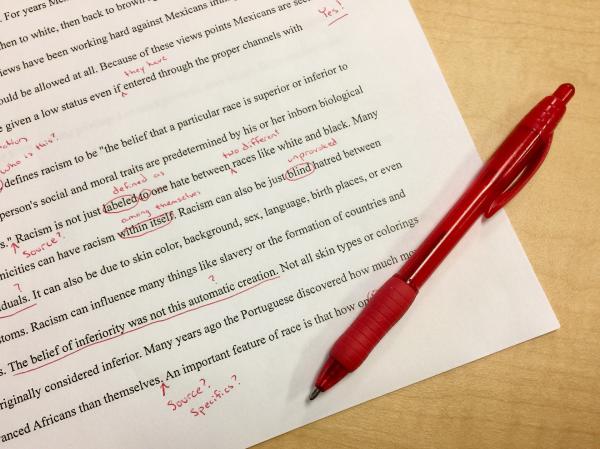Is English Language More Important Than English Literature?


One aspect of learning English literature is developing critical thinking. In applying critical thinking to the question ‘is English language more important than English literature?', we see that it lacks context. This means we need to know for what purpose is literature or language more important. Is it a general question as to the value they both have in the world? Is it a question related to your future education choices, particularly at University level? Is the level of importance even something which is quantifiable? Critical thinking is important, but so too is the simple ability to understand the words we read. oneHOWTO investigates these questions and finds out which is more important for you.
What is English language?
When we say English language, we mean something different from ‘the language of English'. We're talking about educational subjects, the topics of study we learn in schools and other teaching institutions. English language as a subject is the study of the components of this language. This starts with young children learning their ABCs, the building blocks of language (which is why we often see them as actual building blocks).
As with any subject, there are different levels. You may have heard people discuss ‘reading levels’ saying, “my Kevin is so gifted, he can read at a second grade level” (second grade is the equivalent to year three in the UK, New Zealand and Australia). This is because the most important aspect of English language, at least at the beginning, is literacy. This essentially means the ability to read and understand the English language. It is something many adults will take for granted. For those who are illiterate later in life, however, they understand the importance reading has not just on their education, but on personal development and social standing.
Once reading is at an appropriate level, the other aspects of English studies start to develop. At a compulsory education level, these aspects of English language are usually broken down into the following topics:
- Reading: this is the ability to comprehend written language in all its forms. This is most commonly in print, but in the classroom this also means on the board and, increasingly, on screens. Reading comprehension is different from reading literature, more on that below.
- Composition: essentially the language skill of writing, composition takes many forms. It goes all the way from writing your name for the first time to authoring a PhD at postgraduate level. There are many different stages such as personal essays, academic essays, technical writing and more. Again, there is also obvious crossover into English literature.
- Speaking: this is the ability to deliver language orally. It can involve learning language verbatim as well as debating and speech making.
- Listening: this is the ability to understand language as it is delivered by someone or something else. This is the aspect of English language which is delivered first to those with the ability to hear. It is a fundamental part of the majority of people's development.
It is important to differentiate between learning English language as a native speaker and ESL (English as a Second Language). ESL is learned by non-native speakers and is secondary to learning at least one language beforehand. If you decide to continue studying English language at college or university level, then English language develops into many other areas of linguistics.
What is English literature?
Literature is ideas and experiences transferred to the written word which are considered artistic works. This means English literature is the same definition, but specifically for those works which are written in English, whether originally or through translation. English literature is the study not only of texts, but also the context of these texts. That is, the history, composition, interaction, artistry and everything else related to how we read and perceive the literature. It even includes the actual production of the texts through printing, digital publishing and everything else.
English literature takes many forms. These include novels, essays, short stories, biographies, screenplays, comic books, plays, poetry and much more. Even advertisement copy can fall under English literature, although it is more often studied in other disciplines such as communication.
The purpose of English literature is different to English language. English language tries to teach communication through words and speech. English literature tries to convey ideas and experience through English language. In doing so, there may be many different results. It may be to try to inform someone of some factual information. it might be to persuade someone of an interpretation. Literature can also be used to elicit certain emotions, especially in terms of catharsis. It can also entertain, enrage or escape the reader into some other fantasy. The question of what is the purpose of English literature is essentially the same as asking ‘what is the purpose of art?’.
Poetry, novels, plays and other creative writing endeavors try to express the human condition. If you are interested in being creative and look at the world in a critical manner, learning how other writers create their expressions can be a great boon to your creativity. However, the theoretical elements and study of form in English literature can also be applied in many different areas. It is another fundamental of study, so it can be an incredible base for so many different careers, not even those with such a direct emphasis on the written word.

What is more important, English literature or English language?
It is difficult to be objective to the above question, but we will try for the purposes of this article. As we need to be able to understand many different texts, we cannot begin to understand literature through reading if we do not have the literacy skills. This is not to say we won't be able to understand literature. The oral tradition is the process of telling stories and conveying information down generations through speech. Before humans were able to read and write, this was the most important way of keeping information current. Hearing stories, even through film and television, is a very important form of communication and is imperative to people who are illiterate.
In terms of learning the English language, it takes precedence in education as it greatly informs our means of communication. We can't read a book if we don't know what language is. However, in terms of compulsory full-time education, English language is learned in the earlier stages. Once we get to a secondary education level, most students will have the basic concepts learned. These concepts are then applied to every other subject, i.e. being able to read a biology text book.
Once the basics are learned, English language goes into the more advanced stages. This means linguistics, the interplay between language and its meaning. It asks questions about why we use certain terms or why it's useful to communicate in certain ways and not others. This includes phonetics (something not always learned at school level for English language) as well as the meaning of the words we use in the English language. It includes the philosophy of language as well as the form. When taken into further study, you often see the scientific element of language in how it is categorized. It involves experiments and research in a different way to English literature.
English literature is fundamentally a humanities subject. This means the study of human culture and society. English literature develops this subject in terms of the written word. It helps us to understand the human condition and is very closely related to other areas such as history, psychology, cultural studies, sociology, anthropology and many more -ologies. It involves the theory of literature, which also differentiates it from language which is more practical. Of course, between the two there is much overlap.
Past the point of being able to read and write, the answer to the question ‘which is more important, English language or English literature?’ is entirely subjective. It means what is more important to you.
Difference between how and what
If you are studying GCSEs in the UK, then you might be thinking about what to do for A-level. Unlike the sciences which can be broken down into separate subjects, English GCSE is a combination of language and literature. At least, this is the case currently. In 2013, then UK Secretary of Education Michael Gove was intending to introduce changes which deprioritized literature at GCSE and A-level[1]. This has been linked to the decline of other humanities subjects such as classics with fears English literature may go the same way.
However, English literature is still a vital part of English speaking culture and the job opportunities are comprable to English language. At A-level, many people claim English literature to be the more difficult of the two as the concepts involved can be quite difficult to master and there is a large amount of subjectivity involved. However, many people prefer the artistic element of English literature and find it well suited to their sensibility.
This sensibility is important. Essentially, if you want to decide whether to continue studying English language or English literature, do you want to look at how things are said or what is said. If it is ‘how’ then you should investigate language. You can look into how we communicate with each other and all the myriad repercussions linguistics has on we as a people. If you want to go into ‘what’ is said in terms of subject matter, then literature might be for you. This is because you can look at content, how it informs the individual and how it shapes society.
It could also be a matter of your natural abilities. Many people are simply more gifted at one than the other. Someone with dyslexia might find it difficult to go into linguistics as their condition makes understanding grammar and form difficult. However, they may in turn be very creative, having great insight into the theory of literature and how it can apply to society.
If you are wondering what to study, you should know that English literature and English language are both incredibly important to English speaking societies. As they are fundamental to learning, what you can do with them is exponential. Also, you don't have to choose one or the other. While they are both different, they also have many crossover elements which can help keep your options open.
If you want to read similar articles to Is English Language More Important Than English Literature?, we recommend you visit our Learning category.





